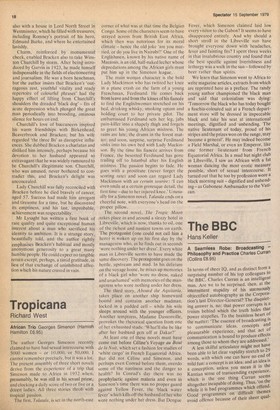Tropicana
Richard West
African Trio Georges Simenon (Hamish Hamilton £6.95) The author Georges Simenon recently claimed to have had sexual intercourse with 5000 women — or 10,000, or 50,000, cannot remember precisely, but it was a lot. The present assembly of three short novels derive from the experience of a trip that Simenon made to Africa in 1932 when, presumably, he was still in his sexual prime, and clocking a daily score of two or five or a dozen ladies. All three stories throb with tropical passion. The first, Talauda, is set in the north-east corner of what was at that time the Belgian Congo. Some of the characters seem to have strayed across from British East Africa, which then was notorious for its moral climate — hence the old joke 'are you mar ried, or do you live in Nairobi?' One of the Englishmen, known by his native name of Macassis, is an old, half-nakedlecher whose depredations among the African girls must put him up in the Simenon league. , The main woman character is the bold Lady Mackinson who has twisted her knee in a plane crash on the farm of a young Frenchman, Ferdinand. He comes back from leave and from the kisses of his fiancée to find the Englishwoman stretched on his bed, drinking whisky, smoking opium and holding court to her private pilot. The embarrassed Ferdinand sets her leg, jabs pain-killer into a shapely thigh and forgets to greet his young African mistress. The rains arc late; the drums in the forest mutter; and soon, surprise, surprise Ferdinand sinks into his own bed with Lady Mackinson, By the time his fiancee arrives from France, the besotted Ferdinand has gone trailing off to Istanbul after his English mistress. The passion begins to fade. He goes with a prostitute (never forget the scoring rate) and soon can regard Lady Mackinson with on certain sourire: 'I can even smile at a certain grotesque detail, the first time—due to her injured knee,' Unusually for a Simenon novel, Talatala ends on a cheerful note, with everyone's head on the proper pillow.
The second novel, The Tropic Moon • takes place in and around a sleazy hotel in Libreville, which is now, thanks to oil, one of the richest and nastiest towns on earth. The protagonist (one could not call him a hero) is woken up on his first day by the manageress who, as he finds out in seconds 'wore nothing under her dress'. Every white man in Libreville seems to have made the same discovery. The protagonist goes on the bottle, upstream and mad. In his delirium on the voyage home, he mixes up memories of a black girl who 'wore no dress, naked and unashamed' with memories of the manageress who wore nothing under her dress.
The third story, Aboard the Aquitankt, takes place on another ship homeward bound and contains another madman, locked in a padded cell — While his wife sleeps around with the younger officers. Another temptress, Madame Dassonville, provokes the rhetorical question from one of her exhausted studs: 'What'll she be like after her husband gets off at Dakar?'
At least one of these novels must have come out before Celine's Voyage au Bout de la Nuit, which set a fashion for studies of 'white cargo' in French Equatorial Africa. But did not Celine and Simenon, and perhaps even Conrad before them, overdo some of the nastiness and the danger to health? In Conrad's day there was no prophylactic against malaria and even in Simenon's time there was no proper guard against Yellow Fever, the 'black water fever' which kills off the husband of her Who wore nothing under her dress. But Dengue Fever, which Simenon claimed laid low every visitor to the Gabon? It seems to have disappeared entirely. And why should a short stroll in the Libreville sun have brought everyone down with headaches, fever and fainting fits? I spent three weeks in that insalubrious country and found that the best specific against liverishness and lethargy was a walk in the sun —followed by beer rather than spirits.
We learn that Simenon went to Africa to write magazine articles, extracts from which are reprinted here as a preface. The randy young author championed the black man and said that colonialism was dying; 'Tomorrow the black who has today bought a fuschia-coloured suit at a French department store will be dressed in impeccable black and take his seat at international meetings, dignified and unbending. The native lieutenant of today, proud of his stripes and the prizes won on the range, may become a general'. He may indeed become a Field Marshal, or even an Emperor, like one former lieutenant from French Equatorial Africa. In a mud hut night club in Libreville, I saw an African with a fat woman dancing the most erotic measure possible, short of sexual intercourse. It turned out that he too by profession wore a black morning suit — dignified and unbending as Gabonese Ambassador to the Vatican.


































 Previous page
Previous page